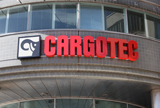 Cargotec is focusing its efforts on projects that improve competitiveness. |
Cargotec has seen sales and orders fall from in the last quarter, with profits also impacted.
The company's latest financial reporting shows a 19% fall in orders in the July quarter, totalling EUR733 million (USD798 million).
Sales slumped 8% to EUR854 million (USD929 million), reducing operating profit by 3% to EUR65.9 million (USD71.8 million).
Cargotec CEO Mika Vehviläinen points out that Hiab bucked the trend, with its core business orders at a good level. "But we did not receive any big defence industry orders as we did during the (same period last year)," he points out.
"Kalmar's result was also satisfactory; however, the pace of customer decision making has slowed down, which could be seen in declining order numbers. Kalmar's long-term market potential is still strong: bigger ship sizes and the need to develop ports and make operations more effective require investments in port technology and automation. The number of potential projects is still large, but customers are delaying their investment decisions."
Vehviläinen sees MacGregor facing a challenging market situation. "The global merchant ship market is facing overcapacity and new ship orders are at an exceptionally low level. Industry consolidation, alliances and possible new ship routes create uncertainty in the industry."
He adds that measures are in place to lower the MacGregor cost level.
"Our strategic focus areas are services, digitalisation and leadership development. In services, we see tremendous business potential that we need to grasp with increased determination. We have increased our efforts in this area; for example, Hiab opened a spare parts web shop in September, MacGregor strengthened its spare parts delivery cooperation relationships in Asia, and Kalmar has initiated new measures to speed up the growth in services.
"In terms of digitalisation, we are developing Cargotec IoT Cloud-based solutions with our customers regarding, for example, automation effectiveness and proactive maintenance. Our internal leadership development programme is expanding to the next phase now that the first 200 leaders have completed the intensive training program.
"We are focusing our efforts on projects that improve competitiveness, the cost efficiency of products and digitalisation. Additionally, we are investing in global systems and procedures that in future enable higher efficiency in operational activities as well as in support functions," he explains.